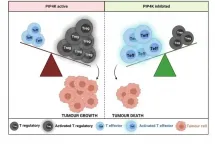A vaginal ring containing the antiretroviral drug dapivirine posed no safety concerns when used in the third trimester of pregnancy, according to results to date from the first study of the dapivirine ring during pregnancy and one of only a few studies of an HIV prevention product in pregnant cisgender women.
The ongoing Phase IIIb study, known as DELIVER, or MTN-042, was designed to evaluate the safety and acceptability of the monthly dapivirine vaginal ring, a new HIV prevention method approved in several African countries and recommended by the World Health Organization (WHO), as well as to collect additional safety data on the use of Truvada® as daily oral pre-exposure prophylaxis (PrEP) during pregnancy. It was also designed to be conducted in stepwise fashion, enrolling one group at a time, beginning with women late in pregnancy, when the potential risks from drug exposure are lowest, and only proceeding to the next group if an independent review of study data deems it is safe to do so.
Reporting their results from the study’s first two cohorts today at the Conference for Retroviruses and Opportunistic Infections (CROI 2023) in Seattle, researchers said pregnancy outcomes and complications experienced by participants, who used either the ring or oral PrEP until the time they delivered, were no different than what would be expected of women in the local communities where DELIVER is being conducted.
“Safety data on the use of these HIV prevention products in this population is vitally important, which is why we designed DELIVER the way we did, enrolling one group at a time, to ensure the safety of both mothers and their babies and so that we would be able to report our results in a more timely fashion rather than waiting until completion of the study,” commented Katherine Bunge, M.P.H., M.D., an assistant professor of obstetrics, gynecology and reproductive sciences at the University of Pittsburgh School of Medicine and a protocol chair of the DELIVER study. “All I can say is, so far, so good!”
Cohort 1 enrolled 150 women who were 36-plus weeks (8-9 months) pregnant, of whom 101 were randomly assigned to use the dapivirine ring and 49 to use Truvada as oral PrEP. Of the 157 participants in Cohort 2, who were between 30- and 35-weeks gestation (7-8 months pregnant) when they joined the study, 106 used the ring and 51 used oral PrEP.
The third and final cohort consists of 251 women who were between 12- and 29-weeks gestation (3-7 months pregnant) at the time they enrolled. In Cohort 3, four times as many participants have been assigned to use the dapivirine ring than oral PrEP. DELIVER is being conducted in Blantyre, Malawi; Johannesburg, South Africa; Kampala, Uganda; and Harare, Zimbabwe.
A woman’s risk of acquiring HIV during pregnancy is estimated to be up to three times higher compared to other periods in her life, and following pregnancy, when many women are breastfeeding, the risk is even greater. DELIVER and its companion study, the B-PROTECTED (MTN-043) study, were designed to provide the kind of information regulatory authorities and national programs would need to consider making the dapivirine ring available to pregnant and breastfeeding women and enable health care providers, and women themselves, to make informed choices about whether to use the ring while pregnant or breastfeeding. Tomorrow at CROI, researchers will be reporting results of B-PROTECTED, the first study of the dapivirine ring in women who are actively breastfeeding, which enrolled 197 breastfeeding mothers and their babies and was conducted at the same sites where DELIVER is taking place.
Most of the information about the safety of Truvada (which contains emtricitabine and tenofovir disoproxil fumarate) during pregnancy and breastfeeding is based on its use for the treatment of HIV in combination with other drugs, with a growing body of evidence finding it safe to use for HIV prevention during pregnancy and breastfeeding as well. Much less is known about the dapivirine ring’s use during pregnancy and breastfeeding.
Though animal studies of dapivirine indicate no concerns related to pregnancy or fetal development, before DELIVER, the only human data was from about 240 participants who became pregnant while using the dapivirine ring in the Phase III trials (ASPIRE and The Ring Study) and stopped using the ring upon learning they were pregnant. Notably, there were no significant differences in pregnancy and infant outcomes between women assigned to use the dapivirine ring and those assigned to use a placebo who became pregnant, suggesting ring use during conception and early pregnancy is not harmful. DELIVER will provide information about the ring when it is used for longer periods and at different stages during pregnancy. Indeed, with today’s results, the study has already contributed greater understanding of the ring’s safety in the third trimester of pregnancy.
Data collected through the MTN-042B sub-study, which involved a review of more than 10,000 medical records at the same hospitals and clinics where DELIVER study participants would give birth, provided researchers with a basis for comparison needed to evaluate the safety of PrEP and the dapivirine ring during pregnancy.
The vast majority of participants in both cohorts delivered full-term (between 37 and 42 weeks) live births, with only 2 percent of births delivered prematurely across both groups in Cohort 1, and in Cohort 2, 6 percent of the births being premature, lower than the 13 percent premature birth rate expected within the trial site communities (though Cohort 1 were almost full term to begin with). There were two stillbirths, one in each cohort, neither of which was deemed related to use of the study product. In cohort 1, the stillbirth occurred in a participant assigned to Truvada as oral PrEP, whereas in Cohort 2 the stillbirth was experienced by a participant using the dapivirine ring. While based on data collected through the MTN-042B sub-study, 4 percent of pregnancies could be expected to result in a stillbirth, the frequency for each product and each cohort was well below this background rate. For Cohort 1, the frequency of stillbirth in the oral PrEP group was 2 percent and 0.7 percent for the cohort as a whole; and for Cohort 2, the frequency of stillbirth was 1 percent for the dapivirine ring and 0.6 percent for the Cohort as a whole.
Complications associated with high blood pressure, or so-called hypertensive disorders of pregnancy, which includes gestational hypertension, eclampsia and preeclampsia, were the most common complications experienced by study participants, but at rates lower than or similar to local background rates of 10.5 percent based on the records review. Hypertensive disorders of pregnancy were experienced by 3 percent of dapivirine ring users in Cohort 1 and 8 percent for Cohort 2; while for oral PrEP, these occurred in 8 percent of Cohort 1 and 10 percent in Cohort 2.
DELIVER is being conducted by the Microbicide Trials Network, which from 2006 until November 30, 2021, was an HIV/AIDS clinical trials network funded by the National Institute of Allergy and Infectious Diseases, with co-funding from the Eunice Kennedy Shriver National Institute of Child Health and Human Development and the National Institute of Mental Health, all components of the U.S. National Institutes of Health.
Follow-up of DELIVER’s third and final cohort of participants, who were between 3 and 7 months pregnant (12-29 weeks) at the time of enrollment, is expected to be completed by mid-2023. Because babies are followed for an additional year after birth, final results are anticipated late 2024 or early 2025.
The clinical trial sites where DELIVER is being conducted are the College of Medicine-Johns Hopkins University Research Project in Blantyre, Malawi; Makerere University-Johns Hopkins University (MU-JHU) Research Collaboration in Kampala, Uganda; Wits Reproductive Health and HIV Institute (Wits RHI) Shandukani Research Centre in Johannesburg, South Africa; and the University of Zimbabwe Clinical Trials Research Centre (UZ-CTRC), Zengeza.
Also leading the study are Felix G. Mhlanga, MBChB, MMed, from UZS-CTRC, who along with Dr. Bunge is a protocol chair; and Lee Fairlie, MBChB, FCPeds (SA), MMED (Paeds) from Wits RHI, who serves as protocol co-chair.
The monthly dapivirine vaginal ring, which was developed by the non-profit International Partnership for Microbicides (IPM), received a positive scientific opinion from the European Medicines Agency in July 2020 for its use by cisgender women at high risk for HIV who cannot or choose not to use daily oral PrEP, and in 2021, WHO recommended the ring as an additional prevention option for women. Countries that have approved the dapivirine ring include Kenya, Rwanda, South Africa, Uganda and Zimbabwe, among others. In mid-2022, the dapivirine vaginal ring and other IPM assets were transferred to the Population Council, a global nonprofit research organization.
# # #
The MTN and the DELIVER study were supported by U.S. National Institutes of Health grants UM1AI068633, UM1AI068615 and UM1AI106707.
The study products for DELIVER were provided by the International Partnership for Microbicides (IPM) and Gilead Sciences.
More information about DELIVER can be found at https://www.mtnstopshiv.org/news/studies/mtn042
About the Microbicide Trials Network
The Microbicide Trials Network (MTN) works within a global community of research programs, investigators and partners committed to the development of a range of HIV prevention options that will meet the needs and preferences of people at different times of their lives. Based at Magee-Womens Research Institute and the University of Pittsburgh, the MTN was from 2006 until November 30, 2021, an HIV/AIDS clinical trials network funded by the National Institute of Allergy and Infectious Diseases (NIAID) with co-funding from the Eunice Kennedy Shriver National Institute of Child Health and Human Development and the National Institute of Mental Health, all components of the U.S. National Institutes of Health. MTN’s mission was to conduct rigorous clinical trials designed specifically to support the potential licensure of promising microbicides – products applied inside the vagina or rectum to prevent the sexual transmission of HIV. MTN studies have provided important insight into what is needed in a rectal microbicide product, contributed to the World Health Organization’s recommendation of the dapivirine vaginal ring as an additional HIV prevention option for women at risk of HIV and the ring’s approval in several countries and include among the first HIV prevention studies involving pregnant and breastfeeding women, a research agenda that still continues with NIAID support. More information about the MTN is available at www.mtnstopshiv.org.
20 February 2023
END




